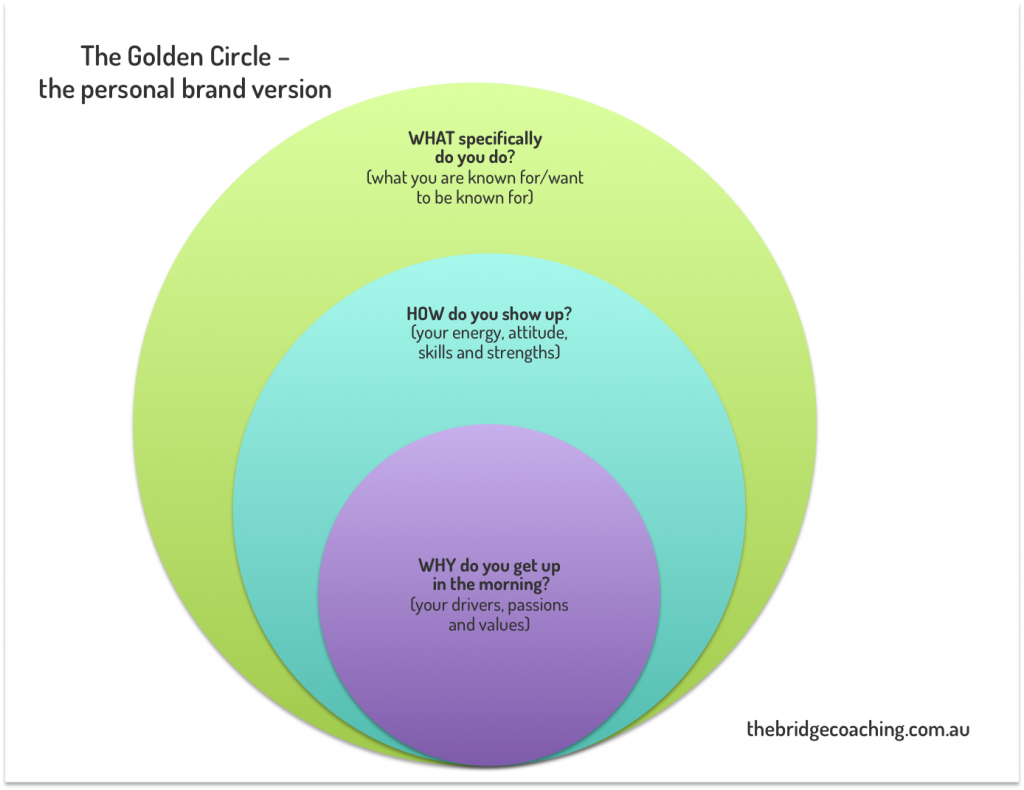You’ve often heard me talk about values and making sure you’re clear on your WHY. In this blog I wanted to talk a bit more about this, but from the perspective of how it can affect your personal brand and the fresh start you can get in both an interview, a new job or a new place.
Every single person I’ve ever worked with (myself included) have gone through those moments when we question “what’s the point?” or “why am I doing this?“. Maybe even the more soul searching version “what am I meant to do now?“. It’s not a great place to be stuck in, but there are many ways out of it and getting clearer on your WHY certainly helps.
In his brilliant book “Start with why“, Simon Sinek talks about the importance of “the golden circle” from a leadership and business perspective. But I’ve found the same concept to be equally true when it comes to leadership of self and the personal brand we share with the world around us. I’ve taken the liberty of modifying Sinek’s original golden circle a bit in the picture below.

When you feel lost it’s easy to jump straight to the WHAT to take action and get out of your rut, confusion or low energy state. But that often involves asking the wrong type of question. So instead of rushing to pitch what you are good at (or what you used to do back in the old place), choose to reverse the order and start with WHY. It’s not the easiest thing to do, but this is an excellent opportunity to evolve your WHY and add new things to your circles!
So how do we navigate the circles from the inside out? Feel free to grab a pen and paper and start answering the below questions!
- WHY do you get out of bed in the morning? What values, beliefs and core passions do you have? These are the things/topics/areas that deeply move you or make you happy/sad/angry/upset. What fuels you to keep going when things get tough? A few examples of a powerful WHY could be “I believe in doing things differently and challenge the traditional 9-5 way of working to get better results and a higher quality of life” or “I deeply care about the environment and believe that we can all do our part to reduce our footprint” or “In a world full of screen time, I believe in bringing people together face to face to collaborate“. You might have a longer WHY than that, or maybe just a few short bullet points. The most important thing is that you are able to articulate it and put it into words that others can easily understand and relate to.
Remember that your WHY can never just be about you, but instead around how you connect with and contribute to the world around you. People can tell very quickly if you genuinely mean it or not. An authentic WHY is clear, inspiring and emotional – and when shared from that space it makes people trust you. In case you did not know, trust is a form of emotive loyalty that’s not always logical. You might be thinking that you don’t know what your WHY is, but I assure you that if you allow time and space you’ll find a whole bunch of things that answers the first question.
- HOW do you show up? When you know why you get up in the morning (even if it still feels a bit abstract) it’s much easier to think about HOW to focus your energy to contribute to your why. As an example, if you are passionate about saving the environment and reducing our collective footprint – HOW would you need to behave? What strengths of yours do you need to leverage? What type of attitude would help you get closer to your why? Which type of energy would help you and those around you? An inclusive, curious and problem solving attitude would probably be loads more helpful than an attitude of judgement, exclusion or anger. Remember – a clear why never comes to life unless you decide HOW to show up to make it happen. How you are showing up is a huge part of your personal brand and how others feel when they are around you.
- WHAT are some things you’ve become known for or want to be known for? This is the last step and where you can use skills and past experience from any area of your life (leadership, drive, organisational skills, ability to listen, sales experience or pretty much anything else) to contribute to the why. This is WHAT you do, the actions you take, the meetings you initiate, what you do on a regular basis to show people that you’re in fact walking your talk towards the WHY you believe in. To illustrate this point I often ask my clients what they would like people to say about them at their own funeral. It’s a big but simple question – how would you like to be remembered once you are gone?
WHAT you do will affect HOW you make people feel which is what will align them to support your path – your WHY.
PS: If you’re keen to try do some great (free) exercises on working out your why, feel free to check out Simon Sinek’s website.